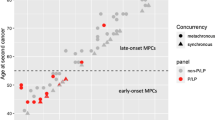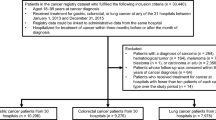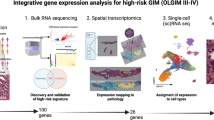Abstract
Lynch syndrome (LS) is an autosomal dominantly inherited disease predisposed to not only colorectal cancer but also other LS-related tumors. Although the clinical and genetic characteristics of LS in Western countries have been well characterized, the information of Japanese LS is limited. As a collaborative study of Japanese Society for Cancer of the Colon and Rectum (JSCCR), we registered colorectal cancer (CRC) patients who fulfilled the modified Amsterdam II criteria including gastric cancer as an LS-related tumor. Among 4030 CRC patients initially registered in this project, 85 patients (2.1%) fulfilled the modified criteria. An additional 26 patients who met the same criteria were enrolled in the analysis. We analyzed three major responsible genes, MLH1, MSH2, and MSH6 by direct sequencing, and further performed multiplex ligation-dependent probe amplification for MLH1 and MSH2. Consequently, we identified pathogenic variants in 64 of the 111 patients comprising of 34 patients in MLH1, 28 in MSH2, and 2 in MSH6. It is of note that large structural alterations were found in 17 patients. Among the 64 patients, 11 patients would not have been enrolled in the analysis if gastric cancer were not included in the modified criteria. In addition, 10 of the 64 variant carriers (15.6%) had medical history of gastric cancer. Furthermore, the standardized incidence ratio of gastric cancer in the LS patients to the Japanese population is estimated to be as high as 20.2. These data underscore the importance of gastric cancer in the diagnosis and healthcare of Japanese LS patients.
Similar content being viewed by others
Login or create a free account to read this content
Gain free access to this article, as well as selected content from this journal and more on nature.com
or
Change history
28 April 2020
An amendment to this paper has been published and can be accessed via a link at the top of the paper.
References
Lynch HT, de la Chapelle A. Genetic susceptibility to non-polyposis colorectal cancer. J Med Genet. 1999;36:801–18.
Ligtenberg MJ, Kuiper RP, Chan TL, Goossens M, Hebeda KM, Voorendt M, et al. Heritable somatic methylation and inactivation of MSH2 in families with Lynch syndrome due to deletion of the 3′ exons of TACSTD1. Nat Genet. 2009;41:112–7.
Peltomaki P. Update on Lynch syndrome genomics. Fam Cancer. 2016;15:385–93.
Cunningham JM, Kim CY, Christensen ER, Tester DJ, Parc Y, Burgart LJ, et al. The frequency of hereditary defective mismatch repair in a prospective series of unselected colorectal carcinomas. Am J Hum Genet. 2001;69:780–90.
Pinol V, Andreu M, Castells A, Paya A, Bessa X, Rodrigo J, et al. Frequency of hereditary non-polyposis colorectal cancer and other colorectal cancer familial forms in Spain: a multicentre, prospective, nationwide study. Eur J Gastroenterol Hepatol. 2004;16:39–45.
Hampel H, Frankel WL, Martin E, Arnold M, Khanduja K, Kuebler P, et al. Screening for the Lynch syndrome (hereditary nonpolyposis colorectal cancer). N Engl J Med. 2005;352:1851–60.
Barnetson RA, Tenesa A, Farrington SM, Nicholl ID, Cetnarskyj R, Porteous ME, et al. Identification and survival of carriers of variants in DNA mismatch-repair genes in colon cancer. N Engl J Med. 2006;354:2751–63.
Vasen HF, Watson P, Mecklin JP, Lynch HT. New clinical criteria for hereditary nonpolyposis colorectal cancer (HNPCC, Lynch syndrome) proposed by the International Collaborative group on HNPCC. Gastroenterology. 1999;116:1453–6.
Umar A, Boland CR, Terdiman JP, Syngal S, de la Chapelle A, Ruschoff J, et al. Revised Bethesda Guidelines for hereditary nonpolyposis colorectal cancer (Lynch syndrome) and microsatellite instability. J Natl Cancer Inst. 2004;96:261–8.
Evaluation of Genomic Applications in P, Prevention Working G. Recommendations from the EGAPP Working Group: genetic testing strategies in newly diagnosed individuals with colorectal cancer aimed at reducing morbidity and mortality from Lynch syndrome in relatives. Genet Med. 2009;11:35–41.
Moreira L, Balaguer F, Lindor N, de la Chapelle A, Hampel H, Aaltonen LA, et al. Identification of Lynch syndrome among patients with colorectal cancer. JAMA. 2012;308:1555–65.
Kohlmann W, Gruber SB. Lynch syndrome. In: Adam MP, Ardinger HH, Pagon RA, Wallace SE, Bean LJH, Stephens K, et al., editors. GeneReviews®. Seattle: University of Washington, WA; 1993.
Watson P, Vasen HFA, Mecklin JP, Bernstein I, Aarnio M, Jarvinen HJ, et al. The risk of extra-colonic, extra-endometrial cancer in the Lynch syndrome. Int J Cancer. 2008;123:444–49.
Capelle LG, Van Grieken NC, Lingsma HF, Steyerberg EW, Klokman WJ, Bruno MJ, et al. Risk and epidemiological time trends of gastric cancer in Lynch syndrome carriers in the Netherlands. Gastroenterology. 2010;138:487–92.
Vasen HF, Blanco I, Aktan-Collan K, Gopie JP, Alonso A, Aretz S, et al. Revised guidelines for the clinical management of Lynch syndrome (HNPCC): recommendations by a group of European experts. Gut. 2013;62:812–23.
Hori M, Matsuda T, Shibata A, Katanoda K, Sobue T, Nishimoto H, et al. Cancer incidence and incidence rates in Japan in 2009: a study of 32 population-based cancer registries for the Monitoring of Cancer Incidence in Japan (MCIJ) project. Jpn J Clin Oncol. 2015;45:884–91.
Buchanan DD, Clendenning M, Rosty C, Eriksen SV, Walsh MD, Walters RJ, et al. Tumor testing to identify lynch syndrome in two Australian colorectal cancer cohorts. J Gastroenterol Hepatol. 2017;32:427–38.
Moller P, Seppala TT, Bernstein I, Holinski-Feder E, Sala P, Gareth Evans D, et al. Cancer risk and survival in path_MMR carriers by gene and gender up to 75 years of age: a report from the Prospective Lynch Syndrome Database. Gut. 2018;67:1306–16.
Park YJ, Shin KH, Park JG. Risk of gastric cancer in hereditary nonpolyposis colorectal cancer in Korea. Clin Cancer Res. 2000;6:2994–8.
Acknowledgements
The authors thank Seira Hatakeyama and Noriko Ikawa for their excellent technical assistance.
Author information
Authors and Affiliations
Consortia
Corresponding author
Ethics declarations
Conflict of interest
The authors declare that they have no conflict of interest.
Additional information
Publisher’s note Springer Nature remains neutral with regard to jurisdictional claims in published maps and institutional affiliations.
Supplementary information
Rights and permissions
About this article
Cite this article
Ikenoue, T., Arai, M., Ishioka, C. et al. Importance of gastric cancer for the diagnosis and surveillance of Japanese Lynch syndrome patients. J Hum Genet 64, 1187–1194 (2019). https://doi.org/10.1038/s10038-019-0674-5
Received:
Revised:
Accepted:
Published:
Issue Date:
DOI: https://doi.org/10.1038/s10038-019-0674-5
This article is cited by
-
Prevalence and genetic spectrum associated with hereditary colorectal cancer syndromes, the need to improve cancer risk awareness, and family cascade testing in Vietnam
Familial Cancer (2023)
-
Gastric metastasis from small bowel adenocarcinoma in a Lynch syndrome patient
Clinical Journal of Gastroenterology (2022)
-
Overview on population screening for carriers with germline mutations in mismatch repair (MMR) genes in China
Hereditary Cancer in Clinical Practice (2021)
-
Gastric cancer is highly prevalent in Lynch syndrome patients with atrophic gastritis
Gastric Cancer (2021)
-
Application of targeted nanopore sequencing for the screening and determination of structural variants in patients with Lynch syndrome
Journal of Human Genetics (2021)



